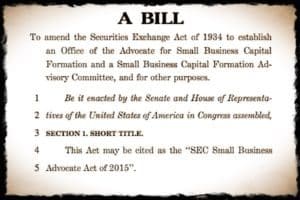
The SEC Small Business Advocate Act of 2016 or HR 3784 passed the Senate on Friday (December 9, 2016) as part of a last-minute legislative push before Congress adjourns for the holiday season. The bill passed the House earlier this year meaning the bill will soon find itself in front of President Obama to be signed into law.
The legislation creates a new office at the Securities and Exchange Commission to advocate on behalf of small business. The majority of economic growth and job creation is driven by smaller businesses yet too frequently policy makers craft rules focusing on larger firms. These regulations can strangle growth and innovation as smaller businesses simply can not shoulder the burden, including the cost, to comply with short sighted rule-making.
The head of the Office will be named the Advocate for Small Business Capital Formation and will report directly to the Commission. The Commission will also have the ability to appoint this individual who’s role includes advocating on behalf of SMEs and small business investors in resolving significant problems with the Commission or with self-regulatory organizations. The Advocate will also identify challenges regarding access to capital – including for minority and women-owned firms.
The Advocate will submit an annual report to the Committee on Banking, Housing, and Urban Affairs of the Senate and the Committee on Financial Services of the House of Representatives.

Sam Guzik, the first person to propose the creation of a small business advocate at the SEC back in 2014, told Crowdfund Insider;
“It is a rare moment in DC when both houses of Congress pronounce new legislation with a unanimous voice. The passage of HR 3784 in 2016 represents one of these unique moments. And not to be lost in the picture is the legislative origin of this bill – drafted and introduced in the House by a Democrat, John Carney, hailing from the State of Delaware – a state where the interests of business are central to its economy. He was quickly joined by a bi-partisan legion of co-sponsors, the first being Republican Sean Duffy from Wisconsin.”
Guzik said the SEC already had an Office of Small Business Policy, currently headed by Sebastian Gomez Abero who Guzik believes is one of the most qualified individuals ever to hold this post. But he is also of the opinion that more needs to be done as small businesses are absolutely vital to the US economy;
“In my view, and in the view of others, the challenges that face small business in the SEC are institutional, requiring supplemental legislation. Significantly, HR 3784 creates a permanent, independent voice for small business at the SEC, which reports not simply to another division director, the head of Corporation Finance, but to the full Commission and to Congress.”
Guzik correctly notes that policy makers are quick to point to accomplishments and loathe to recognize shortcomings of existing policy. Thus an independent voice is dearly needed;
“The Congressional Record is punctuated with testimony from SEC Commissioners and department heads – either in oversight hearings or annual budget requests. However, their focus understandably has been on their positive accomplishments, and defending their record, rather than owning up to current failings of either our federal securities laws or Commission priorities or rulemaking. HR 3784 provides a statutory mandate for this new Office to reach out, and be accountable, to Congress – to identify and propose solutions to unresolved problems requiring further legislation or rulemaking for small and emerging businesses. Will this new legislation be successful? In the long term, yes. Whether it will be effective in the short term is similar to a question asked of President Roosevelt when he signed the Securities Act of 1933 into law: will this be a good law or a bad law? His answer as to the 1933 Act would be equally applicable to HR 3784: The law will only be as good as the person who administers it.
 As the Obama administration passes the baton to the incoming Trump administration, the make-up of the SEC will obviously change. Trump has clearly challenged the regulatory morass that harms both consumers and businesses today.
As the Obama administration passes the baton to the incoming Trump administration, the make-up of the SEC will obviously change. Trump has clearly challenged the regulatory morass that harms both consumers and businesses today.
Many regulatory agencies may be in a unique position to transform the way government operates. Much of the rule-making in past years has created significant barriers to competition against larger firms thus harming smaller companies (and inevitably consumers). The Small Business Advocate, depending on the individual, may help clear the path for a more robust economy.
“Undoubtedly, many will be qualified to assume the position of Chief of the SEC Office of Small Business Advocate,” said Guzik. “The question will be: does this individual have both the capacity and will to be an effective advocate – someone who not only sees the need to change the status quo – but is willing to walk the walk for small business, even when this would be disruptive to the status quo? So in my opinion, the short term success, or failure, of this new office will hinge in large part on the collective wisdom and judgment of the SEC Commissioners, who will ultimately appoint a new Chief.”

